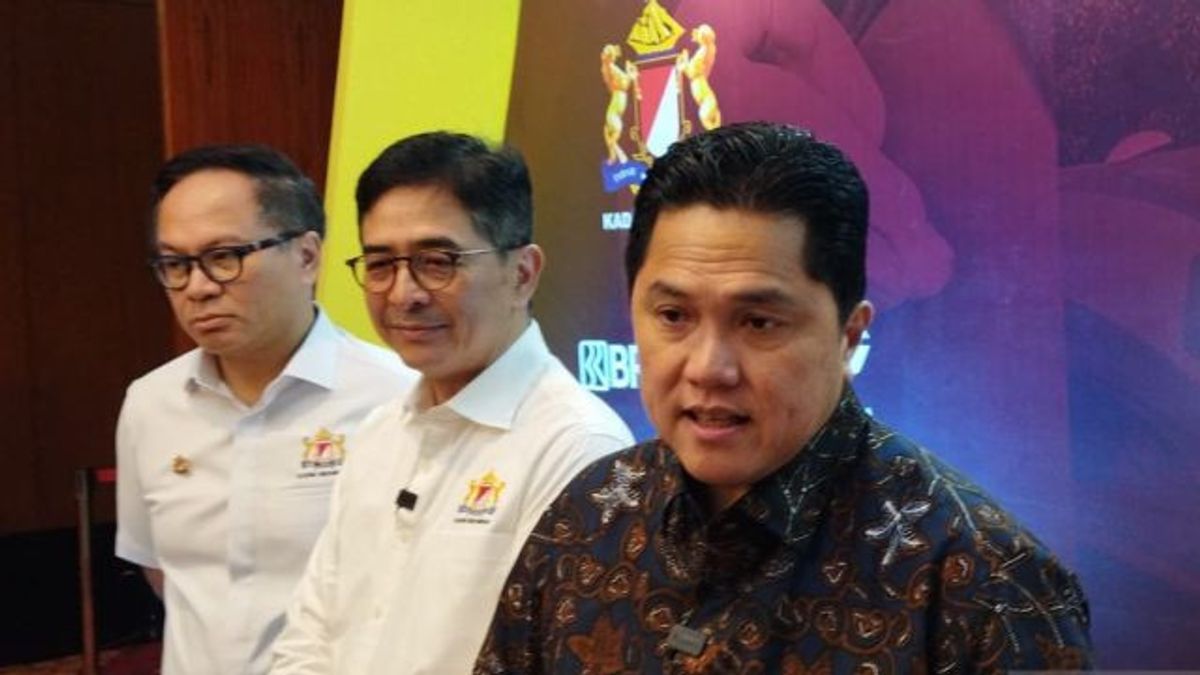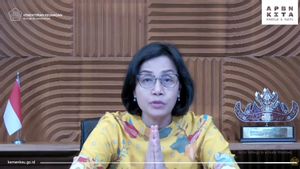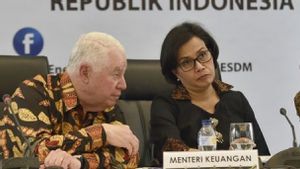JAKARTA - The Indonesian Chamber of Commerce and Industry (Kadin) said that the synergy between state-owned enterprises (BUMN) and the private sector is the key to inclusive economic growth.
"With a sustainable and inclusive relationship between the government, state-owned enterprises, and the private sector, it will certainly contribute significantly to improving the economic and economic level and the nation's economic activities," said Chairman of the Indonesian Chamber of Commerce and Industry Arsjad Rasjid in his remarks during the BUMN-Swasta Synergy Forum held by the Indonesian Chamber of Commerce and Industry, in Jakarta, quoted from Antara, Monday, August 14.
Synergy between the private sector and BUMN and the government has an important role in encouraging Indonesia's development inclusiveness and sustainability, especially in achieving the 2045 Golden Indonesia target.
Arsjad said the forum with the theme "Collaboration for Inclusive Development" is expected to strengthen the commitment of all parties and jointly encourage solid economic growth.
Nevertheless, he acknowledged that there were several challenges in realizing the synergy between SOEs and the private sector.
"The Indonesian Chamber of Commerce and Industry, as representatives of entrepreneurs throughout Indonesia, private companies, and SOEs, recorded several synergy challenges based on input from Kadin members at the center or in the regions. Among them are competing, instead of synergizing," said Arsjad.
According to him, the private sector and SOEs have so far played more on the same terrain, namely those that have developed so that what has happened is competing with each other compared to collaborating, especially in the regions.
"Proyeks that are not profitable, so that SOE synergy projects with the private sector still do not meet economic principles, in the sense of not providing commercial benefits, burdensome requirements, and lack of incentives. A number of private cooperation projects require capital participation that burden the private sector and the lack of incentives in the form of capital support from state-owned banks for private cooperation projects and SOEs," he also said.
Furthermore, he also said that in the future there will still be significant challenges, ranging from food prices and energy that are still high, increasing geopolitical risks, strict and aggressive monetary policies by most central banks in the world to other risks in the global financial system.
"Seeing this challenge, the optimization of collaboration must continue to be established so that all parties can carry out and develop economic democracy in a synergistic manner. SOEs, in this case, must be a pioneer in sectors that are not yet in demand by private businesses and assist the economic development of the community," said Arsjad.
In his remarks, SOE Minister Erick Thohir explained that the transformation of SOEs in the last few years has continued to encourage the increasingly solid performance of SOEs. As reflected in the growth in SOEs' profit in 2022 of IDR 250 trillion (expending one-off profit for restructuring Garuda), growing 100 percent from profit in 2021 of IDR 125 trillion.
This increase, said Erick, had an impact on increasing the contribution of SOEs to Indonesia, as reflected in the commitment to dividend contributions that had touched Rp80.6 trillion, contributions to taxes of Rp278 trillion, and BUMN market capitalization which continued to increase to Rp2,201 trillion in 2022.
SEE ALSO:
"In addition, SOEs that have a role as development agents are also working on national strategic projects whose impacts can be felt directly by the entire community. However, we cannot be complacent, therefore to increase our contribution to the Indonesian economy, SOEs need to optimize synergies with the private sector, including MSMEs, by utilizing their strengths and mitigating their respective weaknesses," said Erick.
Moreover, strong collaboration between SOEs and the private sector has proven to be the main driving force in advancing the community's economy. Through synergistic and directed cooperation, SOEs and the private sector are able to create a sustainable positive impact, encourage inclusive economic growth, and make a significant contribution to national development.
"The combination of BUMN's long-term experience in managing public assets with flexibility and innovation in the private sector has a positive impact on public services and sustainable development. In addition, this collaboration also encourages the transfer of knowledge and technology, strengthens local capabilities and promotes the growth of a more independent national industry," said Erick again.
The English, Chinese, Japanese, Arabic, and French versions are automatically generated by the AI. So there may still be inaccuracies in translating, please always see Indonesian as our main language. (system supported by DigitalSiber.id)















